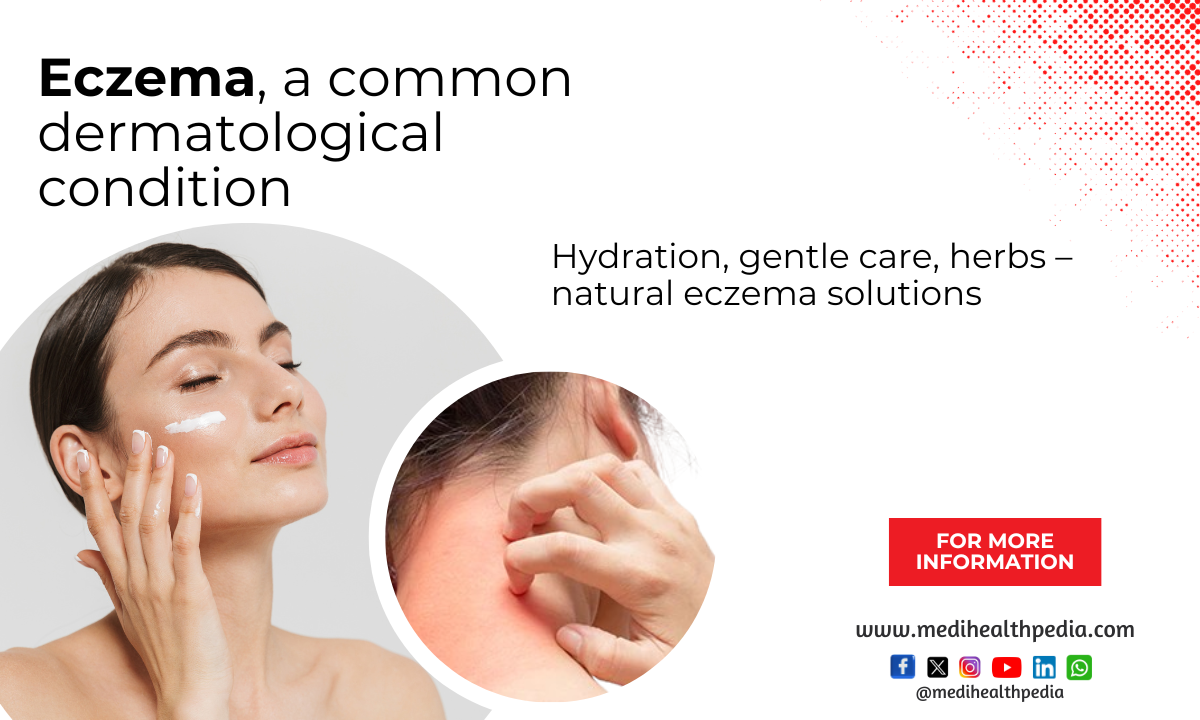Comprehensive Guide to Eczema: Understanding, Managing, and Enhancing Skin Health for Improved Quality of Life
Introduction
Eczema, also known as atopic dermatitis, is a common and often distressing skin condition that affects millions of individuals worldwide. This comprehensive article delves into every aspect of eczema, providing an in-depth exploration of its clinical overview, clinical presentation, crucial diagnostic investigations, potential complications, conventional treatment options, preventive strategies, the role of herbal medicines in treatment, lifestyle modifications, and a conclusion that empowers individuals with the knowledge needed to effectively manage this condition, enhancing skin health and overall well-being.

Clinical Overview
To understand eczema thoroughly, we must first grasp its clinical overview:
- Definition: Eczema is a chronic inflammatory skin disorder characterized by itching, redness, dryness, and rash.
- Prevalence: It ranks as one of the most prevalent skin conditions, affecting individuals of all ages.
- Classification: Eczema exhibits varied patterns and triggers, and it can manifest differently across age groups.
- Triggers: Eczema can be triggered or exacerbated by a range of factors, such as environmental allergens, irritants, stress, and genetics.
Clinical Presentation
The clinical presentation of eczema is diverse, with symptoms that can differ among individuals. Common manifestations include:
- Pruritus: Intense itching is a signature feature of eczema, often leading to frequent scratching and discomfort.
- Erythema: The skin becomes red and inflamed, contributing to the characteristic appearance of eczematous lesions.
- Xerosis: Skin affected by eczema is excessively dry and may exhibit peeling or scaling.
- Eczematous lesions: These can vary from small, red bumps to open, weeping sores, with the degree of severity depending on the individual and the specific type of eczema.
- Lichenification: Prolonged scratching may result in thickening and roughening of the skin.
Basic Investigations
While eczema is primarily diagnosed based on clinical symptoms, specific investigations may be useful for confirmation and further information:
- Skin Prick Tests: Allergy tests can identify potential triggers and underlying sensitivities.
- Patch Tests: These tests aim to determine if contact allergens contribute to the condition, particularly in cases of contact dermatitis.
- Skin Biopsy: In select cases, a skin biopsy may be performed to rule out other skin disorders and provide insights into the degree of inflammation and immune system involvement.
Complications
Eczema can introduce several complications and challenges for individuals, emphasizing the need for effective management:
- Skin infections: Scratching can lead to bacterial or viral infections, which may necessitate medical treatment.
- Impaired sleep: The intense itching associated with eczema can disrupt sleep, leading to daytime fatigue, decreased quality of life, and difficulty concentrating.
- Psychological impact: Eczema can lead to stress, anxiety, and depression, especially in cases of severe and persistent eczema.
- Physical discomfort: Constant itching and discomfort can adversely affect daily life, making it crucial to find effective symptom relief.
Conventional Treatment
Managing eczema typically involves a combination of skincare practices and medications:
- Emollients: Regular application of moisturizers to keep the skin hydrated and reduce dryness, helping to form a protective barrier against external irritants.
- Topical corticosteroids: Anti-inflammatory creams or ointments are used to control itching and inflammation during flare-ups. Their strength may vary depending on the severity of the symptoms.
- Topical calcineurin inhibitors: Non-steroidal creams or ointments that can be used to manage inflammation, particularly in sensitive areas or when corticosteroids may not be ideal.
- Antihistamines: These medications can help alleviate itching, reduce inflammation, and improve sleep, especially if itching is a significant symptom.
- Phototherapy: UV light treatment may be recommended for some cases, with careful monitoring to minimize potential side effects.
- Immunosuppressants: In severe and resistant cases, oral immunosuppressant medications may be prescribed to control inflammation. Regular monitoring and potential side effects are closely managed.
Prevention
Although eczema cannot always be prevented, certain strategies can help minimize flare-ups and reduce symptoms:
- Skincare routine: Establishing and adhering to a consistent skincare routine is paramount to keeping the skin moisturized and reducing irritation. This includes using fragrance-free moisturizers and mild soaps.
- Allergen avoidance: Identifying and avoiding potential triggers, such as specific foods, environmental allergens, and irritants that can exacerbate eczema.
- Stress management: Managing stress and anxiety through techniques such as meditation, mindfulness practices, and exercise can help control symptoms, as stress is a known trigger for many individuals.
- Proper clothing: Choosing breathable fabrics and avoiding tight or scratchy clothing can reduce irritation and itching.
Herbal Medicines for Eczema Treatment
Herbal remedies, while not a replacement for conventional treatment, can offer complementary support for managing eczema. Here are some herbal options:
- Aloe Vera: Known for its soothing and moisturizing properties, aloe vera gel can help reduce skin dryness and irritation.
- Calendula: A natural anti-inflammatory agent, calendula cream may reduce redness and itching when applied topically.
- Chamomile: With anti-inflammatory and anti-itch properties, chamomile may provide relief when used in creams or ointments.
- Coconut Oil: As a natural moisturizer, coconut oil can help alleviate dryness, reduce itching, and create a protective barrier on the skin.
- Turmeric: Turmeric’s anti-inflammatory properties may offer benefits for eczema management. It can be consumed as a supplement or applied as a paste when mixed with water.
Lifestyle Modification for Eczema Management
Individuals with eczema can make lifestyle adjustments to help manage their condition effectively:
- Skincare routine: Consistent and gentle skincare practices, such as applying moisturizer immediately after bathing, can keep the skin hydrated and reduce irritation.
- Allergen management: Identifying and avoiding potential triggers or allergens, such as specific foods, household irritants, or environmental allergens, can minimize flare-ups.
- Stress reduction: Stress management techniques, including meditation, deep breathing, and regular exercise, can help control symptoms and improve overall well-being.
- Dietary choices: Some individuals may find relief by avoiding or reducing intake of specific foods that may trigger eczema, although it’s essential to consult with a healthcare provider or allergist for guidance on allergen identification.
Conclusion
Eczema, or atopic dermatitis, is a common and often challenging skin condition, but with a deep understanding of its clinical overview, clinical presentation, and diagnostic aspects, individuals can take charge of their skin health. Conventional treatments, including skincare practices and medications, remain essential for managing eczema. Additionally, complementary support through herbal remedies, preventive strategies, and lifestyle modifications can contribute to improved skin health and a better quality of life.
Living with eczema may present obstacles, but with the right knowledge and effective management, individuals can minimize the impact of flare-ups, reduce symptoms, and enhance their overall well-being. Education, awareness, and ongoing care are vital components of the journey to achieving healthier and more comfortable skin.

